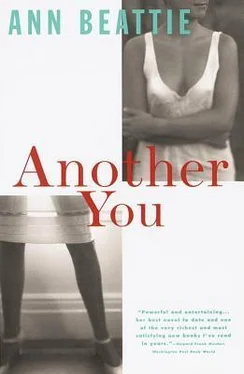Ann Beattie - Another You
Здесь есть возможность читать онлайн «Ann Beattie - Another You» весь текст электронной книги совершенно бесплатно (целиком полную версию без сокращений). В некоторых случаях можно слушать аудио, скачать через торрент в формате fb2 и присутствует краткое содержание. Год выпуска: 2014, Издательство: Vintage Books, Жанр: Современная проза, на английском языке. Описание произведения, (предисловие) а так же отзывы посетителей доступны на портале библиотеки ЛибКат.
- Название:Another You
- Автор:
- Издательство:Vintage Books
- Жанр:
- Год:2014
- ISBN:нет данных
- Рейтинг книги:5 / 5. Голосов: 1
-
Избранное:Добавить в избранное
- Отзывы:
-
Ваша оценка:
- 100
- 1
- 2
- 3
- 4
- 5
Another You: краткое содержание, описание и аннотация
Предлагаем к чтению аннотацию, описание, краткое содержание или предисловие (зависит от того, что написал сам автор книги «Another You»). Если вы не нашли необходимую информацию о книге — напишите в комментариях, мы постараемся отыскать её.
Another You — читать онлайн бесплатно полную книгу (весь текст) целиком
Ниже представлен текст книги, разбитый по страницам. Система сохранения места последней прочитанной страницы, позволяет с удобством читать онлайн бесплатно книгу «Another You», без необходимости каждый раз заново искать на чём Вы остановились. Поставьте закладку, и сможете в любой момент перейти на страницу, на которой закончили чтение.
Интервал:
Закладка:
Evie had always loved him, but it was so clear whom she had come to love most, the light in her eyes sparkling when she looked from him to Sonja. He was at a disadvantage with Evie, of course, because when she became frail, it frightened him, and he backed off. And what did he know about women that age? Young women he did know something about, because he came in contact with them, but he never imagined his students old; it was not that he really thought of them as forever young, but that beyond a certain point, he knew whatever effect he had had on their lives would dissipate. There were not very many Darcy Barrowses. He would be mixed in with other memories, perhaps existing only as a person who provided a footnote to the fondly remembered campus. Or they might remember his name but not much else about him, as they remembered a line of a poem — time would erode the body of the poem and let linger, at best, a line or a phrase. He would no longer be as tall or as handsome, as original or funny, because they would have spent their adult lives inflating and deflating their husbands and lovers. Some would inevitably remember with embarrassment the silly gifts they had bestowed on him, the curlicued calligraphy written on cards with implied messages or, worse yet, cards that seemed humorous because they’d been young and had not yet heard all the jokes. Sometimes — a few times — students had tried to do it over again. The girl who had given him the dumb card of a pig flying over a rainbow writing a real note, years later, about how difficult her life had become and acknowledging what had once been her adolescent crush on him. The person who had given him a cute little plastic lion cub inside a geode now apologizing, in effect, by knitting and sending a conservative blue scarf. The strange cookies, studded with things no adult would want, like chopped Reese’s peanut-butter cups, or miniature marshmallows, replaced by a simple chocolate bar mailed from Paris. Though he got quite a few cards at Christmas — at least for a few years after they’d left, from those students who had particularly liked him — they usually thought of him not at holidays, but at odd times, such as when the line of a poem they’d studied with him was suddenly clarified by what they’d experienced, or when, in their travels, they finally saw a particular painting or sculpture that had been nothing but an allusion in a poem until the moment they stood in front of it and it shimmered. So many of his former students were out there, the ones who grew to his height, but who still thought he was taller than he was, the ones who would always see him running an impatient hand through bushy hair, though his hair was thinning, those who against all evidence continued to believe that he had unique insights, and that he had been speaking to them, personally. And this one thing was always true: in the letters and postcards they sent, they never thought to ask if he remembered them. No doubt that would have been as absurd, considering what he represented, considering their projections onto him, as beginning a letter, Dear Father: As you may remember, I am your son . Well — it was probably true that he simplified their young lives the same way they romanticized his. Or at least he had, until recently, when — without his at first realizing it — his students had begun to seem strange; strangers who were not recognizable, very young people whose motivation he didn’t understand, or feel at all drawn into. The gap had widened. Still, those who cared about him cared about him, but now there were limits to his concern, or even to his infrequent, vague affections. They weren’t even his children; they were somebody else’s children, who would go off and do whatever they did, and after so many years of teaching, he might as well admit he wasn’t doing it because of them, but for personal reasons — personal reasons, plus his salary. He was passing time among them because he liked to read books. Also, the lecturing made for a little excitement; he gave himself credit for impassioned yet overstated appreciations of poets’ rather ordinary terrains, for his dense explanations of matters just slightly opaque. And then he would turn his attention to the students who took the bait, to those whose eyes widened with incredulity. Continuing, just as outrageously, he would then smile slyly at Cheryl Lanier, or anyone else who caught on, at once acknowledging his outrageousness, but also making clear that he had favorites in the classroom, to whom he was speaking directly.
He watched as Sonja’s car came slowly into the drive. It was not until he saw her car that his eyes filled with tears. The neighborhood boys had shovelled the drive early in the morning; otherwise, it would be impassable. They’d be around for their payment as soon as school was out: the big-eared boy the girls called Mickey Mouse and his younger, towheaded brother who was so diminutive they taunted him as Tinkerbell. They had their routine down, Mickey and Tink: Mickey shovelled first, followed by Tink, who widened the path by throwing snow off to the left and right, having the more difficult job but working fast enough to keep up with his brother.
Sonja stepped out of the car, the wind lashing her hair across her face, her bare hand reaching up to pin it back. I have been standing around the house, staring out one window or the other all morning , Marshall thought. Now I’ll have to stare into my wife’s face and tell her Evie has had a seizure . He frowned as he thought of it. Maybe it wasn’t true. Maybe it was made up, invented for effect, as someone in his class had recently accused him of doing when he gave a Marxist interpretation of one of Robert Frost’s poems. Maybe Evie was fine. Maybe Sonja would tell him that.
“I think I got a sale,” Sonja said as he came down the stairs into the front hallway to greet her. “Cross your fingers and hope this one goes through. The housing inspector goes there tomorrow, and I don’t think these people are kidding about being able to pay cash.”
He embraced her, realizing as he did that she would misunderstand and think he was happy about the upcoming sale. He was stalling for time, though what help could a few seconds be? He pulled Sonja tightly to him and told her there was bad news: Evie had had a seizure. He could tell from her suddenly rigid body that Sonja believed this entirely. “But Marshall — I just saw her,” Sonja whispered.
“They’ve taken her to the morgue,” he said, the word out of his mouth before he realized what he was saying. “To the hospital,” he said quickly.
“Which is it?” she said, looking at him as if he were mad.
He was so surprised at the stupidity his awkwardness produced that he didn’t dare speak again. He looked blankly back at her.
“You think I can’t handle it if she’s dead?” Sonja’s eyes had filled with tears.
“She isn’t dead, she’s fine,” he said.
“Fine?” Sonja echoed.
At that moment, all he could think to do was to throw himself into Sonja’s arms — this time he was not embracing her so much as he was pleading with her to embrace him. Which she did, standing there sniffling, her head against his chest. Finally, she said, “Why are we just standing here?”
* * *
It wasn’t until five-thirty that he realized he’d forgotten to call Jenny Oughton, and when he did call, from a pay phone in the hospital lounge, he left his message, his apology, on the answering machine. The clinic was closed for the weekend. He would have to ask Sonja for Jenny’s home number, call her there, and explain why he hadn’t shown up. As he stood talking to the answering machine, he realized that he was looking at what had by now become a very familiar face: the face of a coyote on the wildlife magazine that always seemed to be thrown somewhere in his bathroom, the magazine that was also thrown on a tabletop in the hospital lounge.
Читать дальшеИнтервал:
Закладка:
Похожие книги на «Another You»
Представляем Вашему вниманию похожие книги на «Another You» списком для выбора. Мы отобрали схожую по названию и смыслу литературу в надежде предоставить читателям больше вариантов отыскать новые, интересные, ещё непрочитанные произведения.
Обсуждение, отзывы о книге «Another You» и просто собственные мнения читателей. Оставьте ваши комментарии, напишите, что Вы думаете о произведении, его смысле или главных героях. Укажите что конкретно понравилось, а что нет, и почему Вы так считаете.












